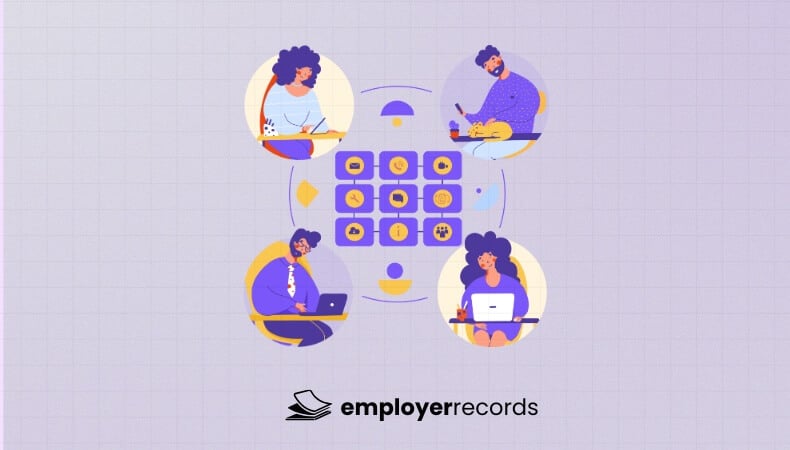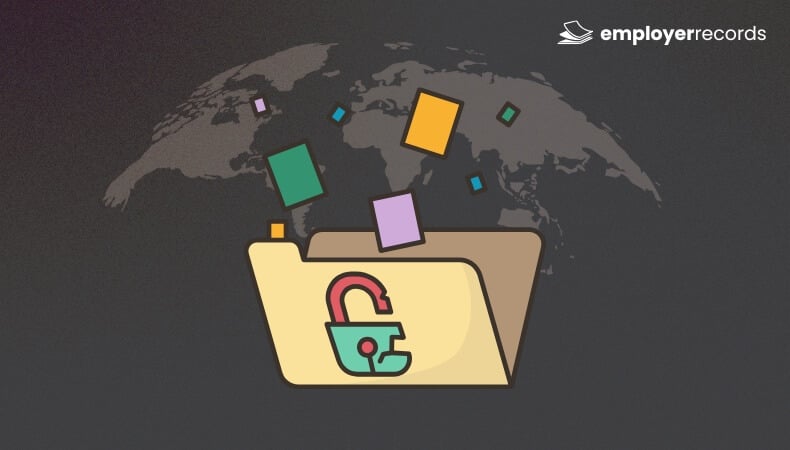The global shift towards remote work has unlocked access to diverse talent pools, enabling businesses to operate beyond traditional geographic boundaries. While this evolution offers unparalleled flexibility and growth opportunities, it also introduces a complex web of compliance challenges.
Companies must grapple with varying labor laws, tax regulations, employment standards, and benefits requirements across different jurisdictions. Missteps in these areas can lead to legal penalties, financial losses, and reputational damage.
To navigate this intricate landscape, many organizations are turning to Employer of Record (EOR) services. An EOR acts as the legal employer on behalf of a company, managing payroll, taxes, benefits, and compliance with local labor laws.
This partnership allows businesses to focus on their core operations while ensuring that their remote workforce is managed by regional regulations. By leveraging EOR solutions, companies can confidently expand their global presence, knowing that compliance complexities are expertly handled.
What Is An Employer Of Record (EOR)?
An Employer of Record (EOR) is a third-party organization that legally employs workers on behalf of another company. While you manage your employees’ daily activities and performance, the EOR assumes responsibility for formal employment tasks.
These include processing payroll, withholding and remitting taxes, administering benefits, ensuring compliance with local labor laws, and managing employment contracts.
By handling these administrative and legal responsibilities, an EOR enables businesses to hire globally without establishing a local entity, ensuring compliance and reducing operational complexities.
- Payroll Processing: Ensuring timely and accurate salary disbursements in compliance with local standards.
- Tax Compliance: Managing tax withholdings and filings as per regional requirements.
- Benefits Administration: Providing statutory and supplementary benefits aligned with local norms.
- Employment Contracts: Drafting and maintaining contracts that comply with local labor laws.
- Regulatory Compliance: Staying abreast of and adhering to changing employment laws and regulations.
By partnering with an EOR, businesses can swiftly onboard international talent without the need to establish a legal entity in each country.
The Compliance Challenges In Remote Work
Operating a remote workforce across multiple countries introduces a wide range of legal and regulatory hurdles that companies must navigate carefully.
Without a deep understanding of each region’s employment laws, even well-intentioned businesses can unintentionally fall out of compliance, leading to costly consequences.

01. Diverse Labor Laws
Navigating the complex landscape of international labor laws is a significant challenge for companies employing remote workers across different jurisdictions.
Each country has its own regulations concerning employment contracts, working hours, termination procedures, and employee rights. Failing to comply with these laws can lead to legal disputes, financial penalties, and reputational damage.
Employers must stay informed and adapt their policies to align with the local labor standards of each region where their remote employees operate.
02. Taxation Complexities
Managing tax obligations for a distributed workforce involves understanding and adhering to various tax laws and regulations. Remote employees may create tax liabilities in their country of residence, and employers must ensure proper withholding, reporting, and payment of taxes.
Additionally, navigating tax treaties and avoiding double taxation requires careful planning. Non-compliance can result in audits, fines, and strained relationships with tax authorities.
03. Benefits and Entitlements
Benefits and entitlements for remote employees vary dramatically by country, encompassing healthcare, retirement contributions, paid leave, and social security requirements.
Employers must tailor their packages to meet or exceed these statutory mandates to avoid legal penalties and remain competitive in talent acquisition and retention. Failure to comply can lead to fines, litigation, and decreased employee satisfaction and loyalty.
- Statutory Variations: Healthcare plans, pension contributions, and leave entitlements differ widely across jurisdictions, requiring localized benefit designs.
- Competitive Compliance: Exceeding minimum legal requirements can enhance employer branding and improve talent retention in a global workforce.
- Risk Mitigation: Non-compliance exposes companies to financial penalties, legal disputes, and reputational harm, making thorough benefits audits essential.
04. Data Protection Regulations
Handling sensitive employee and company data across borders introduces data privacy and protection risks. Different countries enforce various data protection laws, such as the General Data Protection Regulation (GDPR) in the European Union.
Employers must implement robust data security measures, ensure lawful data processing, and respect data subject rights. Non-compliance can result in substantial fines and damage to the company’s reputation.
05. Permanent Establishment Risks:
Employing remote workers in foreign countries can inadvertently create a “permanent establishment” (PE) for tax purposes, subjecting the company to local corporate taxes and compliance obligations.
Activities such as having employees negotiate contracts or make sales decisions may trigger PE status. Understanding the thresholds constituting a PE and structuring remote work arrangements accordingly is crucial to avoid unexpected tax liabilities and legal complexities.
Failure to address these challenges can result in legal penalties, financial losses, and reputational damage.
How EORs Ensure Compliance In Remote Work
Ensuring compliance in remote work can be daunting, especially when managing teams across different legal and regulatory environments. EORs simplify this process by acting as localized compliance experts who take on the burden of legal employment responsibilities:
- Expertise in Local Laws: EORs possess in-depth knowledge of regional employment laws, ensuring all practices are compliant.
- Efficient Payroll Management: Handling multi-currency payrolls and ensuring accurate tax withholdings.
- Benefits Administration: Providing benefits packages that meet or exceed local statutory requirements.
- Regulatory Updates: Keeping abreast of legal changes and updating employment practices accordingly.
- Risk Mitigation: Assuming legal responsibility for employment compliance, thereby shielding your business from potential liabilities.
By leveraging an EOR, companies can focus on their core operations while ensuring their remote workforce is managed compliantly.
Case Study: TechStart’s Global Expansion
TechStart, a San Francisco–based software startup, faced difficulty sourcing specialized developers locally and broadened its search to Eastern Europe and Southeast Asia to tap into niche talent pools.
Over a two‑month period, they successfully onboarded 15 international employees across five different countries by partnering with an Employer of Record (EOR) service.
An EOR is a third‑party organization that assumes formal employment responsibilities, such as payroll processing, tax withholding, benefits administration, and compliance with local labor laws, while client companies retain control over the daily management of their teams.
This arrangement allowed TechStart’s leadership to focus on product development and team integration, rather than administrative paperwork. The EOR managed employment contracts that met each region’s legal standards and kept the company aligned with evolving regulations, reducing the risk of fines or disputes.
By handling multi‑jurisdictional tax filings and statutory benefit contributions, the EOR substantially lowered TechStart’s administrative burden and shielded it from permanent establishment risks.
Consequently, TechStart scaled its global footprint rapidly without the cost or delay of establishing local legal entities, exemplifying how EOR partnerships can accelerate international expansion for high‑growth startups.
EOR vs. Setting Up A Local Entity
Choosing between an Employer of Record and setting up a local legal entity is a critical decision for businesses expanding internationally. Each approach offers distinct advantages and trade-offs depending on your company’s goals, resources, and timeline.
| Aspect | EOR | Local Entity |
| Setup Time | Weeks | Months |
| Compliance Management | Handled by EOR | Requires in-house legal expertise |
| Cost | Predictable service fees | High initial and ongoing operational costs |
| Flexibility | High; easy to scale up or down | The company bears all compliance risks |
| Risk Exposure | EOR assumes legal responsibilities | Company bears all compliance risks |
Choosing between an EOR and establishing a local entity depends on your business goals, budget, and long-term plans. However, for rapid expansion and reduced compliance burdens, EORs offer a compelling solution.
Conclusion
As remote work reshapes global employment, ensuring compliance across multiple jurisdictions remains a complex and evolving challenge. Organizations must navigate diverse labor laws, tax regimes, data privacy rules, and benefits requirements, where mistakes can lead to fines and business disruptions.
EOR services act as strategic partners by legally employing international staff, managing payroll, taxes, benefits, and regulatory compliance without requiring local entities.
Entrusting compliance to EORs such as Globalization Partners, Remote, and Multiplier helps companies mitigate permanent establishment risks and rapidly scale teams.
This approach empowers businesses to concentrate on innovation and growth, confident that their remote workforce is managed legally, efficiently, and sustainably.







